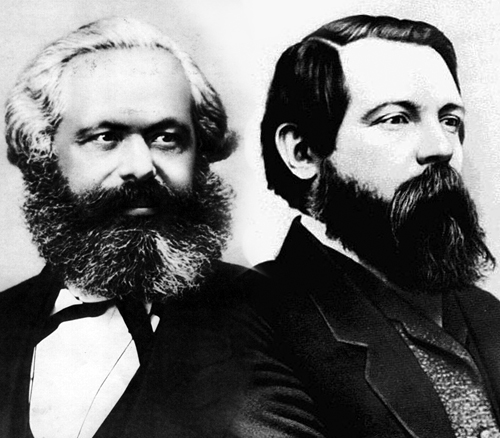I'm talking about conventional perspectives on the lumpenproletariat; early marxists clearly ran in different circles than I do.
A contemporary definition from the Communist Party of Texas:
Generally unemployable people who make no positive contribution to an economy. Sometimes described as the bottom layer of a capitalist society. May include criminal and mentally unstable people. Some activists consider them "most radical" because they are "most exploited," but they are un-organizable and more likely to act as paid agents than to have any progressive role in class struggle.
I can just feel the classism dripping out.
The wikipedia article about the phrase basically illustrates the idea of the lumpenproletariat as having been used as a punching bag by Marx, to create a foil to the proletariat in order to glorify the latter's revolutionary potential. From The Communist Manifesto:
The lumpenproletariat is passive decaying matter of the lowest layers of the old society, is here and there thrust into the [progressive] movement by a proletarian revolution; [however,] in accordance with its whole way of life, it is more likely to sell out to reactionary intrigues.
Anyway, I find this whole line of thinking precisely as deplorable as Marx, and Engels, and those who followed found the lumpenproletariat. Apparently Mao saw more revolutionary potential in the lumpenproletariat, believing they were at least educable.
It seems like the Black Panther Party looked toward the lumpenproletariat with some humanity, and they saw revolutionary potential in "the brother who's pimping, the brother who's hustling, the unemployed, the downtrodden, the brother who's robbing banks, who's not politically conscious," as Bobby Seale, in-part, defined the lumpenproletariat.
This feels much more honest and humane than the classical definitions, which I guess a lot of the major communist orgs in the u.s. still run with.
Finally, I'll just copy and paste the very short 'criticism' section from the wiki article as some food for thought:
Ernesto Laclau argued that Marx's dismissal of the lumpenproletariat showed the limitations of his theory of economic determinism and argued that the group and "its possible integration into the politics of populism as an 'absolute outside' that threatens the coherence of ideological identifications." Mark Cowling argues that the "concept is being used for its political impact rather than because it provides good explanations" and that its political impact is "pernicious" and an "obstacle to clear analysis." Laura Pulido argues that there is a diversity in the lumpen population, especially in terms of consciousness.
Anyway, just one of those 'holy shit' moments. Usually I vibe hard with classical marxism, but they can't all be hits. Wondering other peoples' takes.
But don't go telling me that my lumpen comrades are economically predestined to not be revolutionary socialists, because that analysis would run in direct contradiction to material realities ;)


deleted by creator
I mean, the two definitions I copy-pasted were directly from The Communist Party of Texas and from The Communist Manifesto haha.
I agree though that a major subtext of the article was to obscure, or to point to the fuzziness, of Marx’s ‘definition’ of the term. Maybe that’s unfair?
That definition did change throughout his life, and there have been countless interpretations since, which the article looks at and basically concludes ‘there’s no one defintion of the word’, which I think is fair to say.
deleted by creator
Ya, and no harsh recieved. The title was admittedly bombastic, and I tried to show a few different angles on the term in the post :) and I tried to quote original texts more than wiki.
Obviously the end goal of communism is the betterment of life for all, so in that regard M&E couldn’t have hated poor people. However, I did notice language of distaste towards certain occupations that I respect, which came across as classist more than scientific. You might call that aesthetic, with the implication that it’s unimportant, but to me it kinda matters. Not all that much tho haha I’m not gonna be offended by 150 year old words or anything. But I do think that, effectively, talking shit about the ‘undersirables’ and counting them out isn’t particularly useful, but we can disagree :)
Lumpen becomes a much more useful concept, imo, when you focus on the organized crime elements. Buskers aren’t gonna be counter-revolutionary because their livlihood depends on grifting (entertaining) the proletariat ffs hahaha we don’t make enough money to be loyal to capital
I think my core disagreement with Marx’s original position was the discounting of the revolutionary potential of disparate demographics by lumpin’ them all together as lumpen. As people have pointed out, Marx himself had wavered on that position throughout his life, acknowledging that the dynamics were different in France. Just as Mao felt differently in his context, and Bakunin, and the Black Panthers, and so on. I’m certain that the dynamics are different now, too.
Ngl, I have no idea who the Communist Party of the USA is, and I’m not american, but I thought it would be good to include a prominent american example. And for some reason, the Texas party is a particularly big one? Haha
But it struck me that they appeared to learn nothing from marxists since Marx. They just parrot the original stuff, which is an exclusionary line and reads extremely elitist, at a time when recruitment is basically all socialists have. Marx may have discounted the underclass for much of his life, but I think he was wrong to do so, much like the Black Panthers and Mao did etc., on which we agree :)